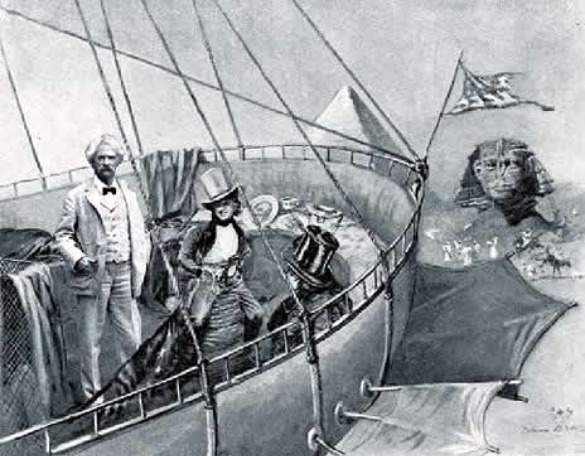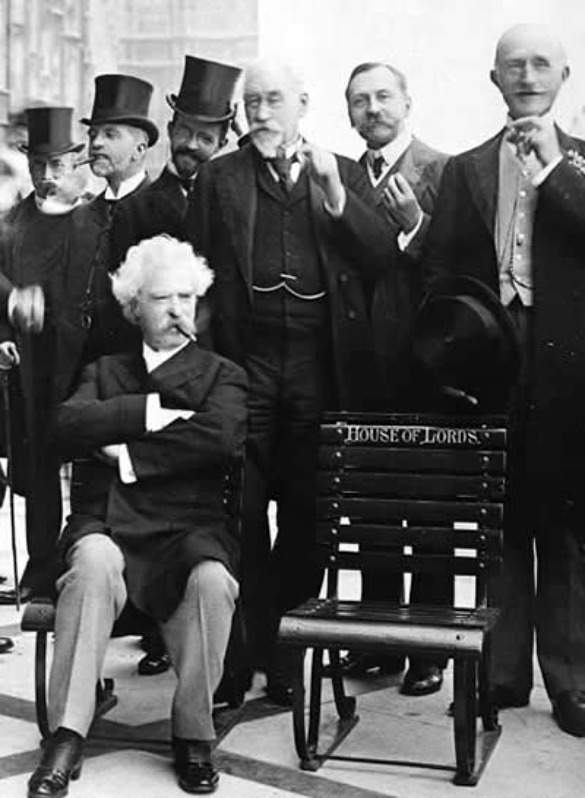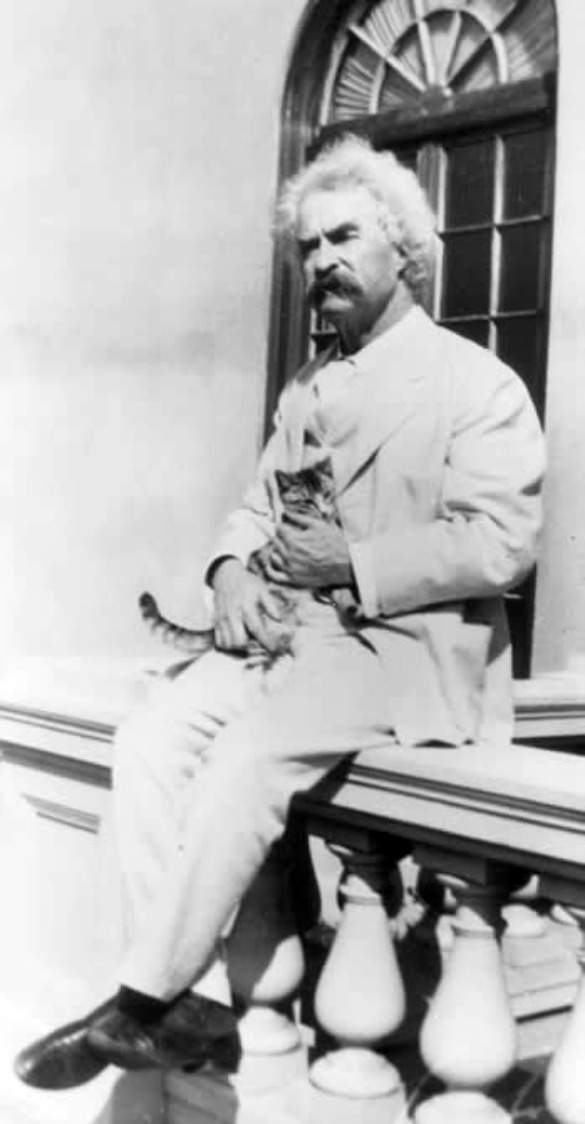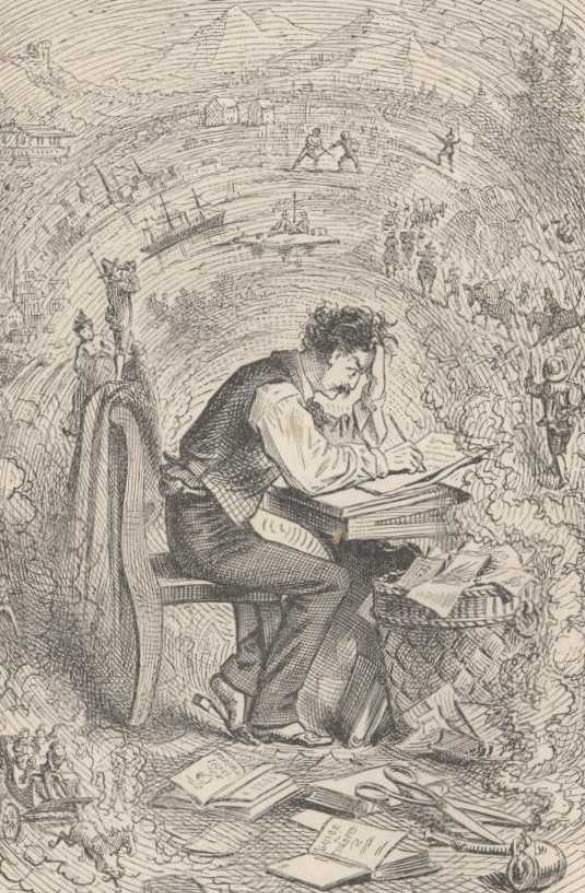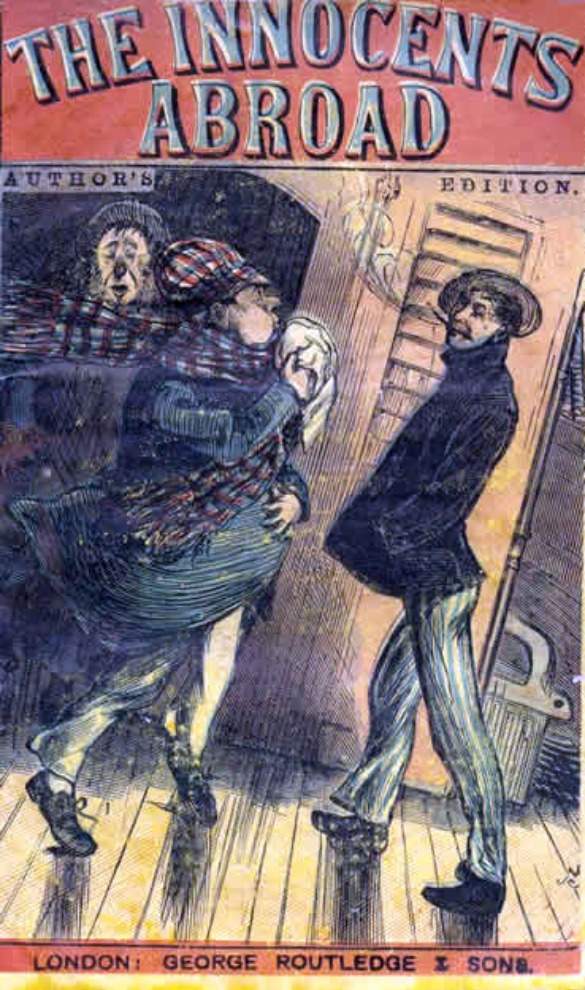Mark Twain: The Great Misadventurer
Mark Twain is best known as a humorist or perhaps as the author of Huckleberry Finn—but his first significant successes were newspaper articles, books and lecture tours based around his wide-ranging travel experiences. Twain’s greatest skill was his ability to appreciate the contrasts that travel presented without carrying the burdens of prejudice that influenced so many of his contemporaries. His viewpoint was distinctly American, and yet he was often highly critical of how he witnessed Americans behaving on foreign soil. The Innocent’s Abroad, Roughing It, A Tramp Abroad and Following the Equator each offer evidence of the author’s ability to find beauty in misadventures and soak up his surroundings—all the while keeping his spirits high whenever things didn’t go his way.
We are very excited to present Mark Twain’s “How I Travel.”
Travel is fatal to prejudice, bigotry, and narrow-mindedness
and many of our people need it sorely on these accounts. Broad, wholesome, charitable views of men and things cannot be acquired by vegetating in one little corner of the earth all one’s lifetime.
I have found out that there ain’t no surer way to find out whether you like people or hate them than to travel with them.
Laws are sand, customs are rock.
Laws can be evaded and punishment escaped, but an openly transgressed custom brings sure punishment. The penalty may be unfair, unrighteous, illogical, and a cruelty; no matter, it will be inflicted, just the same. Certainly, then, there can be but one wise thing for a visiting stranger to do–find out what the country’s customs are, and refrain from offending against them.
There can be but one wise thing for a visiting stranger to do–find out what the country’s customs are, and refrain from offending against them.
The gentle reader will never, never know what a consummate ass he can become until he goes abroad.
I speak now, of course, in the supposition that the gentle reader has not been abroad, and therefore is not already a consummate ass. If the case be otherwise, I beg his pardon and extend to him the cordial hand of fellowship and call him brother.
There is no unhappiness like the misery of sighting land (and work) again after a cheerful, careless voyage.
It liberates the vandal to travel
–you never saw a bigoted, opinionated, stubborn, narrow-minded, self-conceited, almighty mean man in your life but he had stuck in one place since he was born and thought God made the world and dyspepsia and bile for his especial comfort and satisfaction.
Nothing so liberalizes a man and expands the kindly instincts that nature put in him as travel and contact with many kinds of people.
I am not in any way qualified to travel alone.
It was kind of solemn drifting down the big still river
laying on our backs looking up at stars and we didn’t even feel like talking aloud.
Go to heaven for the climate and hell for the company.
Hotels are the only proper places for lecturers.
When I am ill-natured I so enjoy the freedom of a hotel where I can ring up a domestic and give him a quarter and then break furniture over him.
The most permanent lessons in morals are those which come, not of booky teaching, but of experience.
A man who keeps company with glaciers comes to feel tolerably insignificant by and by.
The Alps and the glaciers together are able to take every bit of conceit out of a man and reduce his self-importance to zero if he will only remain within the influence of their sublime presence long enough to give it a fair and reasonable chance to do its work.
The most permanent lessons in morals are those which come, not of booky teaching, but of experience.
On [a long sea] voyage, with its eternal monotonies, people’s intellects deteriorate…
The mind gradually becomes inert, dull, blunted; it loses its accustomed interest in intellectual things; nothing but horse-play can rouse it.
Don’t go around saying the world owes you a living.
The world owes you nothing. It was here first.
We said there warn’t no home like a raft, after all.
Other places do seem so cramped up and smothery, but a raft don’t. You feel mighty free and easy and comfortable on a raft.
There are only two best ways to travel through Switzerland.
The first best is afoot. The second best is by open two-horse carriage.
The world owes you nothing. It was here first.
What is it that confers the noblest delight?
What is that which swells a man’s breast with pride above that which any other experience can bring to him? Discovery! To know that you are walking where none others have walked; that you are beholding what human eye has not see before; that you are breathing a virgin atmosphere.
Of course, when one begins to find fault with foreign people’s ways, he is very likely to get a reminder to look nearer home.
The equator was wisely put where it is…
because if it had been run through Europe all the kings would have tried to grab it.
For me its balmy airs are always blowing, its summer seas flashing in the sun;
the pulsing of its surf is in my ear; I can see its garlanded crags, its leaping cascades, its plumy palms drowsing by the shore, its remote summits floating like islands above the cloud-rack; I can feel the spirit of its woody solitudes, I hear the splashing of the brooks; in my nostrils still lives the breath of flowers that perished twenty years ago. [re: Hawaii]
Don’t look at the world with your hands in your pockets.
To write about it you have to reach out and touch it.
If there wasn’t anything to find out, it would be dull.
Even trying to find out and not finding out is just as interesting as trying to find out and finding out; and I don’t know but more so.
They examine passports on the Italian frontier
for fear an honest man may slip in.
We sailed for America, and there made certain preparations…
Two members of my family elected to go with me. Also a carbuncle. The dictionary says a carbuncle is a kind of jewel. Humor is out of place in a dictionary.
Your road is everything that a road ought to be . . .
and yet you will not stay in it half a mile, for the reason that little, seductive, mysterious roads are always branching out from it on either hand, and as these curve sharply also and hide what is beyond, you cannot resist the temptation to desert your own chosen road and explore them. [re: Bermuda]
We moved westward about mid-afternoon over a rippled and summer sea;
…an enticing sea, a clean and cool sea, and apparently a welcome sea to all on board
I have no race prejudices nor caste prejudices nor creed prejudices.
All I care to know is that a man is a human being, and that is enough for me; he can’t be any worse.
I started out alone to seek adventures.
You don’t really have to seek them—that is nothing but a phrase—they come to you.
Get a bicycle.
You will not regret it, if you live.
All I care to know is that a man is a human being, and that is enough for me; he can’t be any worse.
We had a sunset of a very fine sort.
The vast plain of the sea was marked off in bands of sharply-contrasted colors: great stretches of dark blue, others of purple, others of polished bronze; the billowy mountains showed all sorts of dainty browns and greens, blues and purples and blacks, and the rounded velvety backs of certain of them made one want to stroke them, as one would the sleek back of a cat. The long, sloping promontory projecting into the sea at the west turned dim and leaden and spectral, then became suffused with pink–dissolved itself in a pink dream, so to speak, it seemed so airy and unreal. Presently the cloud-rack was flooded with fiery splendors, and these were copied on the surface of the sea, and it made one drunk with delight to look upon it.
In Paris they just simply opened their eyes and stared when we spoke to them in French!
We never did succeed in making those idiots understand their own language.
Let us live so that when we come to die even the undertaker will be sorry.
Twenty years from now you will be more disappointed by the things that you didn’t do than by the ones you did do.
So throw off the bowlines. Sail away from the safe harbor. Catch the trade winds in your sails. Explore. Dream. Discover.
[It’s worth noting that this quote, though often attributed to Twain, remains unverified. We have included it because we are sure the author would approve. If nothing else, he would laugh at the fact that the final quote presented was something that he never got around to actually saying. – THE EDITORS]
“How I Travel” is a BootsnAll series publishing every Friday in an effort to look at the unique and diverse travel habits of some of the world’s most well known and proficient road warriors.
all photographs provided by Mark Twain & the Twain Estate and may not be used without permission

